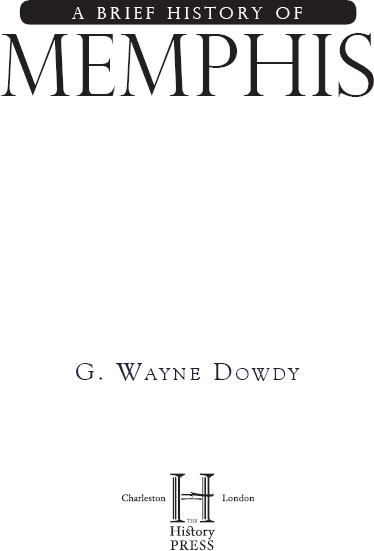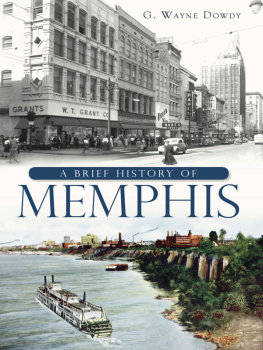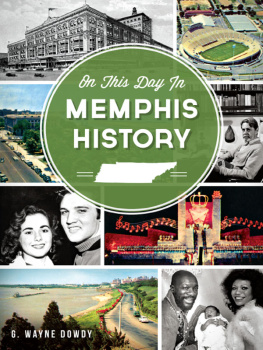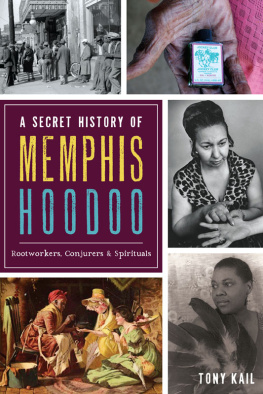G. Wayne Dowdy - A Brief History of Memphis
Here you can read online G. Wayne Dowdy - A Brief History of Memphis full text of the book (entire story) in english for free. Download pdf and epub, get meaning, cover and reviews about this ebook. year: 2013, publisher: Arcadia Publishing, genre: Politics. Description of the work, (preface) as well as reviews are available. Best literature library LitArk.com created for fans of good reading and offers a wide selection of genres:
Romance novel
Science fiction
Adventure
Detective
Science
History
Home and family
Prose
Art
Politics
Computer
Non-fiction
Religion
Business
Children
Humor
Choose a favorite category and find really read worthwhile books. Enjoy immersion in the world of imagination, feel the emotions of the characters or learn something new for yourself, make an fascinating discovery.
- Book:A Brief History of Memphis
- Author:
- Publisher:Arcadia Publishing
- Genre:
- Year:2013
- Rating:4 / 5
- Favourites:Add to favourites
- Your mark:
- 80
- 1
- 2
- 3
- 4
- 5
A Brief History of Memphis: summary, description and annotation
We offer to read an annotation, description, summary or preface (depends on what the author of the book "A Brief History of Memphis" wrote himself). If you haven't found the necessary information about the book — write in the comments, we will try to find it.
A Brief History of Memphis — read online for free the complete book (whole text) full work
Below is the text of the book, divided by pages. System saving the place of the last page read, allows you to conveniently read the book "A Brief History of Memphis" online for free, without having to search again every time where you left off. Put a bookmark, and you can go to the page where you finished reading at any time.
Font size:
Interval:
Bookmark:


Published by The History Press
Charleston, SC 29403
www.historypress.net
Copyright 2011 by G. Wayne Dowdy
All rights reserved
All images courtesy of the Memphis and Shelby County Room, Memphis Public Library and Information Center.
First published 2011
e-book edition 2013
Manufactured in the United States
ISBN 978.1.62584.202.2
Dowdy, G. Wayne.
A brief history of Memphis / G. Wayne Dowdy.
p. cm.
Includes bibliographical references and index.
print edition ISBN 978-1-60949-440-7
1. Memphis (Tenn.)--History. I. Title.
F444.M557D687 2011
976.819--dc23
2011036090
Notice: The information in this book is true and complete to the best of our knowledge. It is offered without guarantee on the part of the author or The History Press. The author and The History Press disclaim all liability in connection with the use of this book.
All rights reserved. No part of this book may be reproduced or transmitted in any form whatsoever without prior written permission from the publisher except in the case of brief quotations embodied in critical articles and reviews.
For Barbara and Gerald.
CONTENTS
ACKNOWLEDGEMENTS
When I was a boy, my mother, Barbara Ann Nance Dowdy, patiently read aloud to me billboards, books, cereal boxes, movie posters, newspapers, traffic signs and any other printed material that excited my curiosity. It was from her that I developed a fascination with the written word. My father, Gerald McLain Dowdy, always has a story to tell, and it was from him that I first learned the importance of narrative in describing the events of the past. My mother did not live to see this volume completed, but her love is pressed between every page. I dedicate this book to my parents; my grandparents, John McLain and Ivy Lucile Heckle Dowdy and William Herbert and Lurline Belle Griffin Nance; my brother and sister-in-law, William Johnathan Bud and Robin Paige Clement Dowdy; my niece, Britney Amber Dowdy; my nephews, Cody Austin Dowdy and Brandon Ryan Dowdy; Uncle J.B. and Aunt Carole Nance; and Uncle Larry H. Nance, Uncle Ron G. and Aunt Donna Nance and Aunt Viola Heckle. Lastly, I also dedicate this to my cousins: Justin, Clay and Clint Nance; Lisa Nance Brooks; Mike, Forrest and Ariana Brooks; Chris, Heather and Haleigh Nance; Gene and Jean Hair Miller; Laura Leigh Miller Traylor; John, Olivia Belle and Conrad Traylor; Eddie, Rachael, Alex and Stuart Miller; Lanie and Martha Miller; Faye Stabler; Kim Hair Sox; Donald, Corey and Luke Sox; W.D. Hair; Wanda and Tate Gattis; and Ann and Harold Waldon.
I also wish to thank my colleagues in the history and social sciences department at the Benjamin L. Hooks Central Library, Betty Blaylock, Joan Cannon, Jeramy Clark, Gina Cordell, Laura Cunningham, Dr. Barbara D. Flanary, Sarah Frierson, Priscilla Harris, Verjeana Hunt, Dr. James R. Johnson, Thomas W. Jones, Patricia M. LaPointe, Patrick W. ODaniel, Belmar Toney, Marilyn Umfrees, Ella Walker and Tanjarae Weddle for all their friendship and encouragement over the years. The administration of the Memphis Public Library and Information CenterDirector Keenon McCloy, Deputy Director Fred Bannerman-Williams and Central Public Services manager Kay Mill Duedeserve recognition for their strong commitment to our local history collections and their unfailing support of my work.
My fellow Kia Kima Staff membersPeter Abell, Robert Allen, Jim Boksa, Brad Bradley, Peter Budd, Robert Cochran, Alan Gilmer, James Greer, Jeff Hodge, Walter Hoehn, Ken Kimble, Hugh Mallory, Andrew Perry, Paul Prothero, Dave Truck Robinson, George R. Smith, Sandy Stan Smith, Jason Stewart, Grant Wade, Jim Warr, Otis Warr IV, Carey White and Donald Woodleehave proven that, despite grave warnings, the Thunderbird will never die. My friend Hugh Higginbotham knows more about Memphis than anyone, and fortunately for me, he never makes a long story short. Ken Kimble also deserves extra thanks for promoting my books to anyone who would listen. I also want to acknowledge Bruce, Darla, Debbie, Debra, Dexter, Evelyn, George, Gloria, Jennifer, Kiki, Mary, Miss Millie, Pam, Shannon, Stacy and Tara at Charles Cavallos Cupboard Restaurant not only for serving delicious food but also for keeping the spirit of Memphis alive by preserving southern cooking.
I am very fortunate to have two best friends, Gina Cordell and Carey D. White. Gina, along with her husband, Paul Gahn, as well as Careys wife, Beena, and their children, Natacha, Mischa and Dennis, have all freely given their love and support to me over the years even when I am at my worst.
I also could not have written this book without the friendship of several dear family friends who made the past two years a bit more bearable. Sincere gratitude goes to my future nephew-in-law, Larry Pierce, as well as Bill Agee; Marie Bartnick; Kim Soltis Donovan; Judge Donna Fields; Ramona Hubbard; Jeanetta and Bob Hurt; Eric, Cindy, Carson, Nicholas and Tyler Klein; Ed and Mary McManus; Betty Melendy; Stan Soltis; Judge Bob Weiss; Terry Wells; Dr. Charles and Ann West; and Jo Williams. Finally, The History Press is a wonderful publisher to write for, and I especially owe thanks to Will McKay, Katie Parry and Jamie Barreto for doing such a great job of commissioning, promoting and selling my books.
Introduction
MEMPHISS THREE REVOLUTIONS
No city in the United States provides a historian with a richer tapestry to work with than Memphis. In my previous books, I focused on specific people and events in the Bluff Citys past. My first book, Mayor Crump Dont Like It: Machine Politics in Memphis, was a biography of E.H. Crump and his political machine that dominated the Bluff City during the first half of the twentieth century. Its sequel, Crusades for Freedom: Memphis and the Political Transformation of the American South, traced the momentous changes that swept Memphis and the South between the years 1948 and 1968. Hidden History of Memphis, my third book, provided readers with forgotten stories from the Bluff Citys past, such as the Boy Scout who uncovered a German spy ring during the First World War and the gangster who inspired one of the twentieth centurys greatest novelists.
A Brief History of Memphis is somewhat different from these earlier volumes. Instead of focusing on one notable person or concentrating on a relatively short time span, this book attempts to cover the major events in Memphis history, from its early days as a raucous river town through its emergence as a major southern metropolis in the final decades of the twentieth century. The book also attempts to chronicle the three contributions Memphis made that revolutionized American culture and society.
The most far-reaching of these revolutions was in the field of music, which began with W.C. Handys blues compositions and culminated with Sam Phillips and Elvis Presleys rock-and-roll and the soul sounds of Stax Records. Although less known than the Memphis sound, there were two other significant innovations that began in the Bluff City and went on to transform the world. Entrepreneurs Clarence Saunders, Kemmons Wilson and Fred Smith forever changed the grocery, motel and shipping industries and, consequently, influenced how Americans shopped, traveled and mailed packages. The third and least known of these revolutions occurred in the political arena. Unlike much of the rest of the South, African Americans voted in Memphis in large numbers. Their votes not only swayed the outcome of elections but also laid the foundation for one of the nations most powerful political machines and paved the way for the civil rights movement.
Next pageFont size:
Interval:
Bookmark:
Similar books «A Brief History of Memphis»
Look at similar books to A Brief History of Memphis. We have selected literature similar in name and meaning in the hope of providing readers with more options to find new, interesting, not yet read works.
Discussion, reviews of the book A Brief History of Memphis and just readers' own opinions. Leave your comments, write what you think about the work, its meaning or the main characters. Specify what exactly you liked and what you didn't like, and why you think so.












